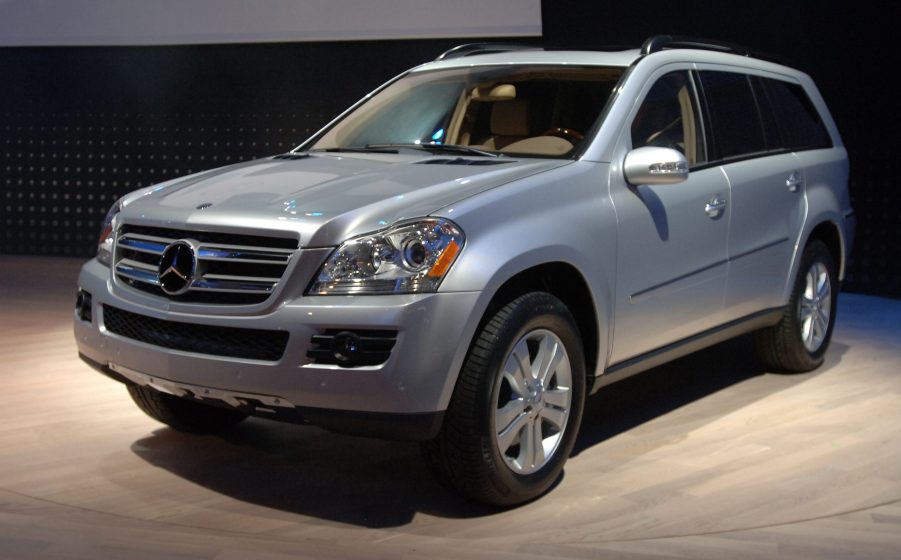
292,287 Mercedes-Benz SUVs Struck With Brake Booster Rust Recall
Mercedes-Benz has a well-deserved reputation for luxury quality, but even it’s not immune to flaws and recall notices. Last year, for example, it faced a class-action lawsuit over exploding glass sunroofs. And now, it just issued a stop-drive recall that affects over 292,000 SUVs and minivans.
Mercedes-Benz recall: Don’t drive your 2006-2012 ML-Class, GL-Class, or R-Class, it might have a rusted brake booster

First, some good news: this Mercedes-Benz recall doesn’t affect any brand-new models. Instead, it only affects R-Class, ML-Class, and GL-Class models in the 2006-2012 model year range. If those names sound unfamiliar, it’s because Mercedes no longer makes the R-Class minivan. Also, the ML-Class is now the GLE-Class and the GL-Class is the GLS-Class.
Regardless, while this recall doesn’t involve new Mercedes models, it does impact an estimated 292,287 vehicles. And the potential issue is dangerous enough that Mercedes-Benz didn’t just issue a recall, it issued a stop-drive one. As in, do not drive your SUV or minivan if it’s part of this recall.
The problem lies in the brake boosters Mercedes-Benz installed in the afflicted SUVs and minivans. Do you know how brakes are ‘power-assisted’? The brake booster is what supplies that power. It amplifies the force that heads from the brake pedal to the master cylinder. More force equals more pressure in the brake fluid which means more braking power. This is very helpful when you’re driving a multi-ton Mercedes-Benz SUV.
Unfortunately, Mercedes-Benz found that the brake boosters fitted to the affected ML-Class, GL-Class, and R-Class models might be corroded. Over time, moisture can seep under a rubber sleeve on the booster housing and cause rust. If that happens, air can leak in and rob precious braking force. But it gets worse.
See, a car with a leaky brake booster can stop—albeit poorly—if it retains enough brake fluid. However, if the booster is, say, severely corroded and you stomp on the brakes, it might fail completely. At which point, your car has no brakes period. And according to Mercedes-Benz, some of these boosters might be that rusty.
How does Mercedes plan to fix this?
As of this writing, Mercedes-Benz says these brake booster corrosion issues haven’t caused any accidents, injuries, or fatalities. But given the potential severity, it understandably and voluntarily issued a stop-drive recall. Because you shouldn’t drive your ML-Class, GL-Class, or R-Class to a local Mercedes-Benz dealership for the recall work, the automaker is providing complimentary towing services for afflicted models.
Once the SUV/minivan gets to the dealership, technicians will inspect the brake booster’s rubber sleeve and housing. If the vehicle’s booster is rust-free, Mercedes-Benz says the owner is free to drive it “’without further action,’” Autoblog says. But if there’s any sign of rust or other damage, the technicians will test it. If it passes, the owner can drive it for two more years, but they’ll need to return it for additional repairs. And if the brake booster is extremely rusty, they’ll replace it immediately.
Is your Mercedes-Benz part of this recall?

If you’re understandably worried that your Mercedes-Benz SUV or minivan is part of this recall, the NHTSA has a handy online VIN-checker tool. Or, you can contact Mercedes directly at (888)548-8514 to see if your ML-Class, GL-Class, or R-Class is affected. In addition, owners of afflicted models should receive a notice in the mail shortly.
UPDATE 6/6/2022: Mercedes recently expanded this brake booster recall into a global one that involves nearly 1 million vehicles. The recall now includes ML-, GL-, and R-Class vehicles from the 2004-2015 model-year period. However, as of this writing, Mercedes-Benz hasn’t included these model years in its U.S.-specific recall.
Follow more updates from MotorBiscuit on our Facebook page.


